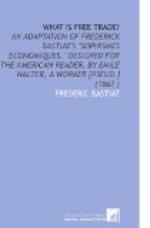Afterward, to test the other theory, suppose we remove the duties on iron, the duties on coffee, and the duties on everything else, so that we shall obtain everything with as little difficulty and outlay of labor as possible. If we then take an account of stock, is it not certain that we shall find more iron in the country, more coffee, more everything else?
Choose then, fellow-countrymen, between scarcity and abundance, between much and little, between Protection and Free Trade. You now know which theory is the right one, for you know the fruits they each bear.
But, it will be answered, if we are inundated with foreign goods and produce, our specie, our precious product of California, our dollars, will leave the country.
Well, what of that? Man is not fed with coin. He does not dress in gold, nor warm himself with silver. What does it matter, then, whether there be more or less specie in the country, provided there be more bread in the cupboard, more meat in the larder, more clothes in the wardrobe, and more fuel in the cellar?
Again, it will be objected, if we accustom ourselves to depend upon England for iron, what shall we do in case of a war with that country?
To this I reply, we shall then be compelled to produce iron ourselves. But, again I am told, we will not be prepared; we will have no furnaces in blast, no forges ready. True; neither will there be any time when war shall occur that the country will not be already filled with all the iron we shall want until we can make it here. Did the Confederates in the late war lack for iron? Why, then, shall we manufacture our own staples and bolts because we may some day or other have a quarrel with our ironmonger!
To sum up:
A radical antagonism exists between the vender and the buyer.
The former wishes the article offered to be scarce, and the supply to be small, so that the price may be high.
The latter wishes it abundant and the supply to be large, so that the price may be low.
The laws, which should at least remain neutral, take part for the vender against the buyer; for the producer against the consumer; for high against low prices; for scarcity against abundance; for protection against free trade. They act, if not intentionally, at least logically, upon the principle that a nation is rich in proportion as it is in want of everything.
CHAPTER II.
OBSTACLES TO WEALTH AND CAUSES OF WEALTH.
Man is naturally in a state of entire destitution.
Between this state, and the satisfying of his wants, there exist a number of obstacles which it is the object of labor to surmount.
I wish to make a journey of some hundred miles. But between the point of my departure and my destination there are interposed mountains, rivers, swamps, forests, robbers; in a word—obstacles. To overcome these obstacles it is necessary that I should bestow much labor and great efforts in opposing them; or, what is the same thing, if others do it for me, I must pay them the value of their exertions. IT IS EVIDENT THAT I WOULD HAVE BEEN BETTER OFF HAD THESE OBSTACLES NEVER EXISTED. Remember this.




